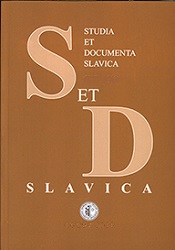NIEPOKOJĄCA ZMYSŁOWOŚĆ. KOBIETY W DZIENNIKACH PODRÓŻY GUSTAVA ZECHENTERA-LASKOMERSKIEGO I MARTINA KUKUČÍNA
THE DISTURBING SENSUALITY. WOMEN IN GUSTAV ZECHENTER-LASKOMERSKÝ’S AND MARTIN KUKUČÍN’S TRAVEL DIARIES
Author(s): Aleksandra HudymačSubject(s): Gender Studies, Literary Texts, Slovak Literature
Published by: Uniwersytet Opolski
Keywords: Slovak literature; travel diaries; Gustav Zechenter-Laskomerský; Martin Kukučín; the Orient; the East; the Balkans; women; orientalism;
Summary/Abstract: The Orient (as well as the Balkans) is one of the deepest rooted images of “the Other” in European culture. Contact with the Other open the possibility to set the limits of one’s own identity, but also create the opportunity to formulate a number of stereotypes about that otherness. One of the central stereotypes is the myth of eastern/southern femininity and sensuality. In other words, one of the central points of the phenomenon of “orientalism”, as described by Edward Said, is the figure of a woman dangerously sensual and dissolute or – on the other hand – deprived of her femininity. The attitude towards oriental and southern beauties anticipates, on the basis of pars pro toto, the attitude towards the Orient and the Balkans in general. In this relation, like in the lens, a series of colonizing aspirations of the West is focused. Both Slovak writers approach the East and South just as representatives of Western European civilization. The reports of their journeys in their journals confirm Said’s findings that the ideas of Western European intellectuals about the Orient and the Balkans had little to do with the reality of the East and South.
Journal: Studia et Documenta Slavica
- Issue Year: 7/2019
- Issue No: 1
- Page Range: 25-40
- Page Count: 16
- Language: Polish

